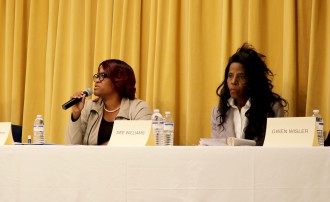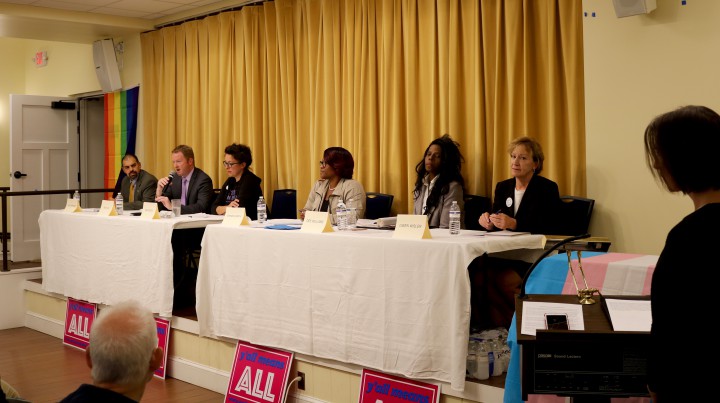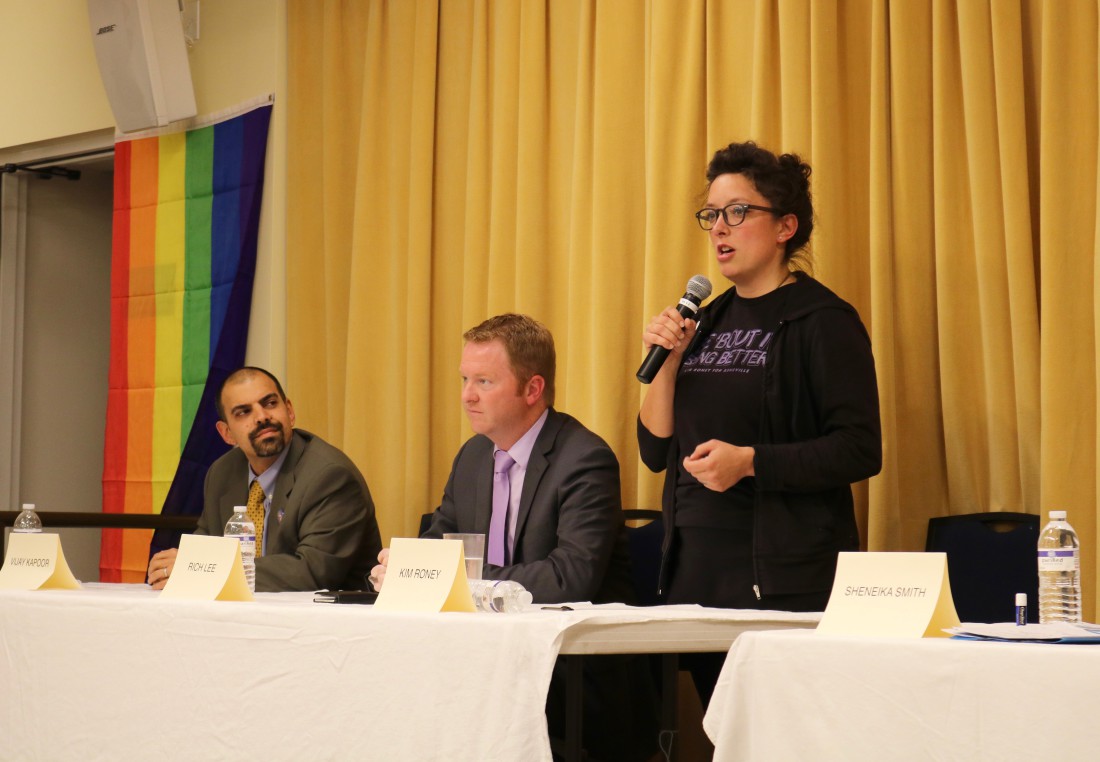Asheville, N.C. — Candidates for City Council called into question how progressive Asheville really is when it comes to rights and protections for those in the LGBTQ community at an Oct. 25 forum. Representatives from four sponsoring organizations — Tranzmission, the Campaign for Southern Equality, Blue Ridge Pride Center and the Western North Carolina AIDS Project — pushed the six Council candidates for ideas on how they plan to support queer and transgender youth, individuals experiencing homelessness, and those struggling with opioid addiction.
All six candidates said they would be in favor of the city of Asheville implementing a nondiscrimination ordinance, which is currently disallowed under House Bill 142 passed by the N.C. General Assembly in March. HB142 repealed HB2, the “bathroom bill” that required people to only use the restroom corresponding to the gender on their birth certificate in government facilities. But HB142 also stated, “No local government in this State may enact or amend an ordinance regulating private employment practices or regulating public accommodations,” effectively banning municipalities from passing their own nondiscrimination policies at least until Dec. 1, 2020, when that section sunsets.

Moderator Allison Scott and Zeke Christopoulos of Tranzmission, an Asheville-based nonprofit that works to improve the lives of trans and gender-nonconforming individuals, pressed the candidates on whether they would support the city passing a nondiscrimination ordinance to protect LGBTQ residents when HB142 sunsets or is repealed. All six said yes. Christopoulos then clarified that the question originally also asked if candidates would support such an ordinance even while HB142 is still on the books, which could put the city at odds with the state, and all the candidates appeared to say yes.
Dee Williams said Asheville should have passed a policy protecting the rights of LGBTQ people awhile ago, as other cities in North Carolina such as Charlotte and Greensboro have done. “The only way to make people safe is to put the muscle of public policy behind it and to stand behind it,” she said. “I am going to be very candid about it. Every time we get ready to do something in Asheville, we use the excuse that the General Assembly or the state — well, so what if we get sued? We go to court for other things. What is more important than civil rights?”
Rich Lee said he thought Asheville missed an opportunity to stand with Charlotte when it passed a nondiscrimination ordinance in the lead-up to the passage of HB2. “I also want to recognize that that strategy by Charlotte City Council didn’t come out of nowhere and it wasn’t designed to be a futile stand. They found a legal peg to hang a nondiscrimination ordinance, the first I am aware of in the state, and moved to pass it in a way that was strategic, tactical and legal,” he said.
Lee said Asheville can and should do something similar, but, “We need to be courageous about it but we need to be clear that we’re not going to lead the people of Asheville into a wall or off a cliff.”
The word “strategic” came up often in Vijay Kapoor’s responses to questions about how the city should proceed in standing up for its marginalized citizens — he joked he’d uttered it “like 400 times tonight.” He said he would be in favor of Asheville enacting nondiscrimination policies, but added, “You do have to be very strategic as far as what you challenge and how you challenge. I’m not a big fan of running right into court without thinking through an actual strategy.”
Kapoor said people should be aware of the tricky relationship the city has with the current Republican-dominated state legislature. “There is a target on Asheville’s back right now, and one of the things you do run the risk on is if you push and you’re not strategic about it, there is a vindictive nature right now in our state legislature. There absolutely is,” he said. “And those people who will be hurt are the same people we are trying to help.”
Incumbent Gwen Wisler said in her time on Council she has pushed the envelope for LGBTQ rights and she thinks the city can require entities with which it works to be on board. “I absolutely support looking at any time the city partners with nonprofits or service providers that we make sure that their policies are nondiscriminatory and welcoming,” she said.
Sheneika Smith put forth that being an ally means not assuming you know everything about what individuals need in terms of services but making sure their needs are considered. “I think we have to really think about … a lot of these entities are funded by city dollars, so because our 20-year vision did name equity and inclusion as its No. 1 priority, then we have to lean into that and put that equity lens on everything we do as it pertains to human relations in our community and let that be the guiding principle,” she said.
One way to extend rights to LGBTQ people could come through housing ordinances that prevent discrimination based on sexual orientation, gender expression, gender identity and family status, said Kim Roney. “I think our City Council missed an opportunity by not signing a human rights ordinance and standing with Charlotte in advance of House Bill 2. I realize that it would have gotten us into a legal battle, but there are those people around this room who know how to fight legal battles around human civil rights and they have been successful at it,” she said. “It is time for us now to stand up to House Bill 142 by signing a human rights ordinance around housing. … We have to do it, we have to do it now. There’s no time to wait.”

Telling untold stories
Several candidates pointed out their own experiences with minority and marginalized communities. Kapoor said his dad was born in India, his mom was born in Poland and so, “One of the things that had a big impression on me growing up and realizing as I got older was the fact that my parents at one time in many states couldn’t marry because they were different colors.” Kapoor also highlighted his work as an attorney in Pennsylvania pushing for domestic partner benefits during union negotiations.
Williams said she felt a connection to the hurdles confronted by the LGBTQ community, saying her paternal grandmother was one the first African-American women to live openly as a lesbian in Asheville. “I lived the experience of having to hear my grandmother maligned,” she said. “I know what it is like myself to live in shadows and to constantly be maligned for no other reason except for how you look, how you love and who you are.”
Smith said her participation in the Tzedek Social Justice Fellowship program last year shaped her understanding of LGBTQ rights, anti-Semitism and black liberation. “Asheville is in a position to be really entwined into other movements going on around our state and around our nation, and we really have to pay attention to what’s going on right now even within queer liberation,” she said.
Specifically, Smith said it’s important to listen to transgender women of color, because within their identity they face multiple oppressions. “Asheville has a tendency to corner a movement around cisgender class privilege and also race privilege,” she said. “And I think we have to be very courageous, we have to take a lot of risk and to really resist comfortability.” (Cisgender is a term describing those who do not identify as transgender.)
Roney called out the stories that don’t often get told in Asheville, stories of people who don’t have the luxury of a home and people who run needle exchanges, and she called for making space for grassroots initiatives to work on these issues. “We have this view of ourselves that we want to be a progressive city and we sell ourselves as being a progressive city, but there’s many people that the city isn’t working for, and we can do better,” she said.
Asheville has already made strides to help disadvantaged communities, said Wisler, pointing out her support for the creation of an equity and inclusion manager position on city staff and her championing of a Human Relations Commission. “What I will do is listen to the ideas that come out of the community,” she said. “Tell me, tell City Council what these issues are, give me suggestions as to what we can do to help with that and improve the situation.”
Lee chose to end on a positive note about the power of Asheville to deal with problems such as those confronted by the LGBTQ community. “Something brought all of us in this room here to this place and this time. And for these problems that we’re facing, which are huge, national, global, cultural problems, we have about the best brain trust of anywhere that I can think of in the world to handle them,” he said. “And I think if we don’t handle them here — issues like gentrification and inequality and the assault that we’re under from our federal government — I don’t know what place has a better chance than us.”
The six candidates are competing for three seats on City Council. Election Day is Nov. 7, but early voting is already underway. Find more information in the Xpress Voter Guide and the Buncombe County Elections Services website.




Before you comment
The comments section is here to provide a platform for civil dialogue on the issues we face together as a local community. Xpress is committed to offering this platform for all voices, but when the tone of the discussion gets nasty or strays off topic, we believe many people choose not to participate. Xpress editors are determined to moderate comments to ensure a constructive interchange is maintained. All comments judged not to be in keeping with the spirit of civil discourse will be removed and repeat violators will be banned. See here for our terms of service. Thank you for being part of this effort to promote respectful discussion.